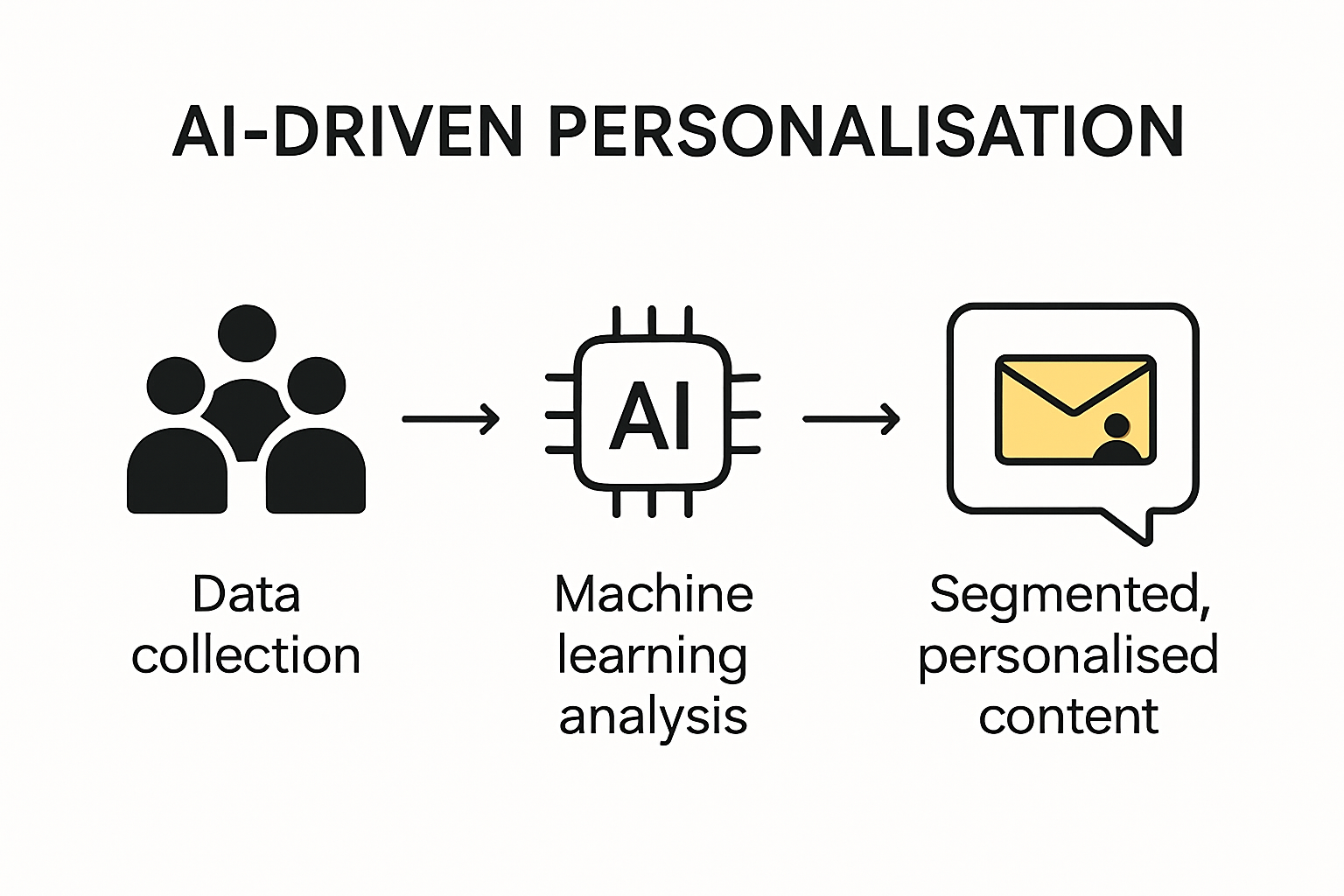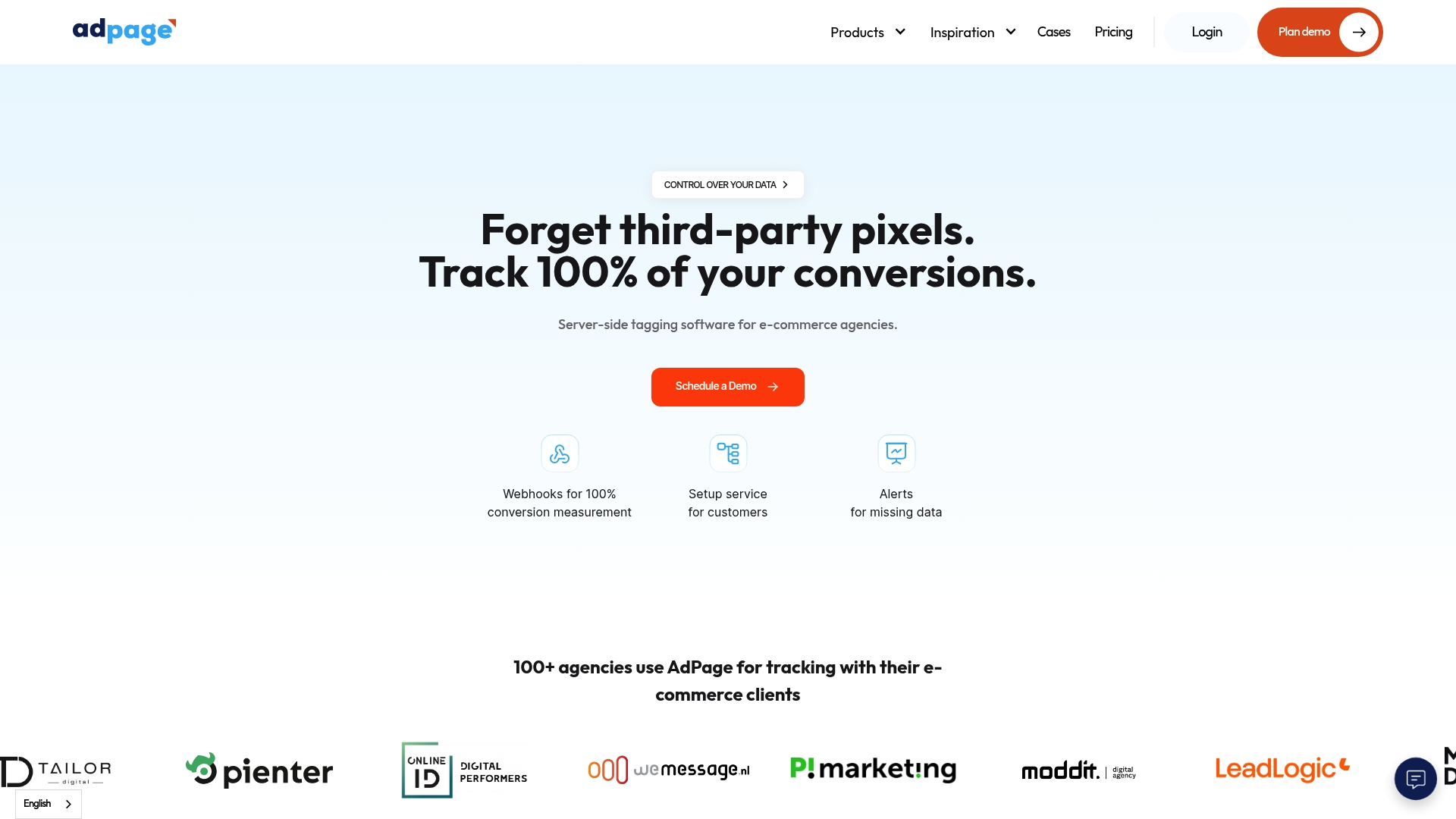Digital marketing trends are changing faster than ever. In fact, AI-driven content now delivers a 12.5 percent increase in click-through rates and an 8.3 percent boost in conversion rates compared to last year. It sounds like technology is making all the decisions, but human creativity and ethical choices have never mattered more when it comes to building real connections with your audience.
Table of Contents
- AI Automation And Personalization In Marketing
- Data-Driven Strategies For Higher Conversion Rates
- Emerging Social Media Channels And Influencer Trends
- Sustainable And Ethical Marketing Practices In 2025.
Quick Summary
| Takeaway | Explanation |
|---|---|
| Leverage AI for Personalization | Use AI tools for targeted content that resonates with specific audience segments, enhancing engagement and conversion rates. |
| Implement Data-Driven Strategies | Apply causal machine learning techniques to identify effective marketing interventions for improved conversion outcomes. |
| Embrace Short-Form Videos | Create compelling short-form video content to capture audience attention quickly and effectively enhance brand storytelling. |
| Focus on Micro-Influencers | Collaborate with micro-influencers for authentic connections and higher engagement rates compared to traditional influencers. |
| Prioritize Sustainable Marketing | Adopt ethical practices and transparent messaging to connect with conscious consumers, building trust and loyalty. |
AI Automation and Personalization in Marketing
Artificial intelligence is transforming digital marketing strategies, enabling unprecedented levels of personalization and operational efficiency. Marketers are now equipped with powerful tools that can analyze complex user data, predict consumer behavior, and create highly targeted experiences at scale.
Intelligent Content Generation and Optimization
AI technologies are revolutionizing content creation through advanced language models that generate precise, engaging marketing materials. Learn more about intelligent content strategies for maximizing conversion potential. According to research exploring LLM-driven e-commerce marketing, AI-generated marketing copy has demonstrated remarkable performance improvements, with a 12.5% increase in click-through rates and an 8.3% boost in conversion rates.
The sophisticated algorithms can now craft personalized messaging that resonates with specific audience segments, analyzing nuanced consumer preferences and behavior patterns. These AI systems go beyond generic templates, creating contextually relevant content that feels authentic and targeted.
Predictive Personalization Strategies
Advanced AI frameworks are enabling marketing teams to develop highly sophisticated personalization strategies. Agentic Personalization research illustrates how AI can optimize cross-channel marketing experiences, currently deployed across 150 million users. These intelligent systems leverage machine learning algorithms to predict user preferences, anticipate customer needs, and dynamically adjust marketing communications in real-time.
The key advantages include:
- Granular Targeting: Precise audience segmentation based on complex behavioral data
- Dynamic Content Adaptation: real-time personalization across multiple marketing channels
- Predictive Consumer Insights: Anticipating customer preferences before explicit actions
Marketing professionals who embrace these AI-driven approaches will gain significant competitive advantages. By combining machine learning capabilities with human creativity, brands can deliver more meaningful, engaging experiences that drive customer loyalty and conversion rates.
The future of digital marketing lies in intelligent automation that respects user privacy while providing hyper-personalized interactions. As AI technologies continue evolving, marketers must remain adaptable, continuously learning and integrating these powerful tools into their strategic frameworks.

Data-Driven Strategies for Higher Conversion Rates.
Modern digital marketing demands a sophisticated approach to understanding and optimizing conversion rates. By leveraging advanced data analytics and machine learning techniques, businesses can transform raw user interactions into strategic insights that dramatically improve marketing performance.
Causal Machine Learning in Marketing Interventions.
Causal machine learning represents a breakthrough in understanding marketing effectiveness. Explore advanced conversion optimization techniques to enhance your marketing strategy. According to research on causal machine learning in marketing strategies, businesses can now precisely assess the impact of specific marketing interventions like coupon campaigns. The study revealed statistically significant positive effects on sales, particularly when targeting specific customer segments with tailored marketing approaches.
This approach moves beyond traditional correlation analysis, enabling marketers to understand the actual causal relationships between marketing actions and customer behaviors. By identifying which interventions genuinely drive conversions, businesses can allocate resources more effectively and design more impactful marketing strategies.
Neural Network Behaviour Modelling
Advanced neural network research is transforming how businesses predict and improve customer conversion rates. By analyzing intricate user interactions such as searched keywords, visited pages, and engagement patterns, these sophisticated models can estimate future conversion potential with unprecedented accuracy.
Key advantages of neural network behavior modeling include:
- Precise Prediction: Accurately forecasting customer conversion likelihood
- Granular Segmentation: Understanding nuanced user behavior patterns
- Dynamic Adaptation: Continuously learning and refining predictive models
Marketing teams can leverage these insights to create more targeted, personalized experiences that resonate with individual user preferences. The ability to anticipate customer needs before they are explicitly expressed represents a significant competitive advantage in the digital marketplace.
Successful data-driven strategies require a holistic approach that combines advanced technological capabilities with strategic human insights. By integrating machine learning, neural networks, and sophisticated analytics, businesses can develop more responsive, intelligent marketing ecosystems that consistently deliver higher conversion rates and improved customer experiences.
To help summarize the different data-driven approaches described above, the table below compares the features and benefits of causal machine learning versus neural network behavior modeling as discussed in this section:
| Approach | Key Focus | Main Benefits | Example Use Case |
|---|---|---|---|
| Causal Machine Learning | Understanding what causes conversions | Identifies which actions/interventions genuinely impact outcomes | Assess effect of coupon campaigns |
| Neural Network Behaviour Modelling | Predicting future user actions and patterns | High accuracy in forecasting conversions and segmenting behavior | Anticipate conversion potential based on user activity |
Emerging Social Media Channels and Influencer Trends
The digital marketing landscape continues to evolve rapidly, with social media platforms and influencer marketing becoming increasingly sophisticated and targeted. Brands must adapt to emerging trends that reshape how audiences consume content and interact with digital marketing strategies.
Short-Form Video Content Revolution
Short-form video content has emerged as a dominant force in digital marketing. Discover cutting-edge marketing strategies to stay ahead of the curve. According to research from Coursera, platforms like TikTok, Instagram Reels, and YouTube Shorts are transforming consumer engagement. These bite-sized video formats capture audience attention more effectively than traditional long-form content, offering brands unprecedented opportunities for creative storytelling and rapid message delivery.
The key to success lies in creating concise, compelling narratives that resonate within seconds. Marketers must craft content that is not only visually appealing but also delivers immediate value, entertainment, or emotional connection.
Micro-Influencer and Authentic Marketing
Forbes research highlights a significant shift toward micro- and nano-influencers who offer more authentic and targeted marketing approaches. These smaller-scale content creators typically demonstrate higher engagement rates and deeper connections with their audiences compared to traditional macro-influencers.
Key characteristics of this emerging influencer trend include:
- Niche Expertise: Focused content within specific domains
- Genuine Connections: Higher trust and relatability with followers
- Cost-Effective Partnerships: More affordable marketing collaborations
According to Agility PR Solutions, brands are now involving influencers directly in product development, creating more collaborative and authentic marketing experiences.
The future of social media marketing demands flexibility, creativity, and a deep understanding of emerging digital communication channels. Successful brands will be those that can quickly adapt to changing audience preferences, leverage innovative content formats, and build genuine connections through strategic, authentic marketing approaches.
Sustainable and Ethical Marketing Practices in 2025.
The digital marketing landscape is undergoing a profound transformation, with sustainability and ethical practices becoming paramount for brands seeking to build genuine connections with conscientious consumers. Marketing strategies in 2025 must go beyond traditional approaches, integrating transparency, social responsibility, and environmental consciousness into core business communications.
Conscious Consumption and Transparency
Explore ethical marketing strategies that align with modern consumer values. According to research on sustainable marketing trends, a significant shift is emerging towards 'de-influencing' - a movement where content creators promote mindful consumption and challenge excessive marketing narratives. This approach reflects a growing consumer desire for authenticity and responsible purchasing decisions.
Key principles of conscious marketing include providing clear, honest information about product origins, environmental impact, and ethical production processes. Brands that demonstrate genuine commitment to sustainability can differentiate themselves in an increasingly competitive digital marketplace.
Below is a quick reference table summarizing the key principles and benefits of conscious marketing practices mentioned in this section:
| Principle | Description | Benefit |
|---|---|---|
| Honest Information | Transparency about product origins and impact | Builds consumer trust |
| De-Influencing | Promotes mindful and responsible purchasing | Counters over-consumption trends |
| Ethical Production | Emphasis on production methods adhering to ethical values | Differentiates brand in digital marketplace |
| Environmental Responsibility | Awareness of sustainability in marketing messaging | Appeals to conscientious consumers |
Digital Carbon Footprint and Ethical Technology
Ethical marketing practices research highlights the critical importance of reducing digital carbon footprints and implementing responsible technological strategies. Marketers are now focusing on optimizing digital content to minimize energy consumption, recognizing the environmental impact of digital communications and data storage.
Emerging ethical marketing considerations include:
- Transparent Data Practices: Clear communication about data collection and usage
- Sustainable Digital Infrastructure: Reducing energy consumption in digital marketing
- Responsible AI Implementation: Ensuring fairness and avoiding algorithmic bias
According to ethical marketing experts, authenticity and storytelling play crucial roles in building trust with consumers. Brands that can effectively communicate their commitment to sustainability and social responsibility will create deeper, more meaningful connections with their audience.
The future of marketing lies in a holistic approach that balances business objectives with genuine social and environmental responsibility. By embracing ethical practices, brands can not only contribute to positive global change but also build long-term customer loyalty and trust in an increasingly conscious consumer landscape.

Frequently Asked Questions
What are the key digital marketing trends to look out for in 2025?
Key trends include AI-driven personalization, data-driven marketing strategies, the rise of short-form video content, and a focus on sustainable and ethical marketing practices.
How can AI improve my digital marketing strategy?
AI can enhance your strategy by providing personalized content that resonates with specific audience segments, optimizing campaigns for better engagement and improving conversion rates through predictive analysis.
Why are micro-influencers becoming more popular in marketing?
Micro-influencers are popular because they offer authentic connections and higher engagement rates with their followers, making them more cost-effective and relatable than traditional influencers.
What does sustainable marketing entail?
Sustainable marketing involves adopting ethical practices, being transparent about product information, promoting responsible consumption, and minimizing the digital carbon footprint to connect with conscious consumers.
Unlock Data-Driven Growth with Future-Proof Conversion Tracking
Staying ahead in digital marketing means more than following trends. As highlighted in "Top Digital Marketing Trends 2025 for Online Success," new strategies such as AI-driven personalization and machine learning models demand accurate data and reliable tracking to truly succeed. Many businesses struggle to measure every conversion because of fragmented data or privacy regulations. If you want your marketing innovations to deliver measurable results, you need a solution that ensures nothing slips through the cracks. Imagine the confidence of knowing that every campaign is fuelled by clean, complete data.

Take the first step toward flawless conversion attribution and maximum ROI. Discover how AdPage empowers marketing professionals to track 100 percent of conversions and optimize campaigns with advanced server-side tagging, consent management, and GDPR-compliant tools. No more guessing. See how seamless integrations and actionable insights set you apart. Experience the difference today with AdPage.



.png)
